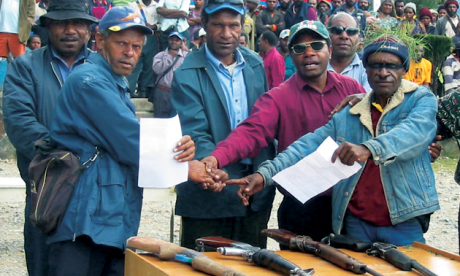The traditional code of conflict solution known as the peace ceremony is PNG’s most equitable and timeless alternative justice system.
In peace ceremonies, the aggrieved parties come together in a public gathering to a neutral location with money and goods like animals, food stuffs etc. The money and goods are exchanged between the aggrieved parties preluded by heart-moving words of remorse, forgiveness, reconciliation, restoration and friendship from the chiefs and leaders of both sides witnessed by church and community leaders including officials of the law and justice.
The amount they give each other is dependent on the degree of damage or suffering one incurs or endures as a result of the conflict. Naturally the party that suffers the most or incurs the worse damage is given more and vice versa.
The peace agreement is profoundly binding and lasting because the amount of money and goods that are exchanged hands are have being negotiated and mutually agreed on by both parties in peace mediation. Negotiations continue if and when there is a disagreement until a final agreement is reached. Then the peace ceremony is equitably and amicably executed.
The money and the goods add substance and value to the whole peace making. Without either a peace agreement would deem vain and unbinding vulnerable to collapse sooner or later.
Tears and/or hugs are instant signs of total remorse, forgiveness, reconciliation, restoration, friendship, peace and harmony. They are the first indicators of a true and lasting peace.
Moreover, there is no loser in a peace ceremony. Both parties are winners.
In contrast, in a modern court of law, there is only one winner and it is either the complainant or the defendant depending on how one convinces the court with his or her evidence regardless of the veracity of the affidavits. The worst villain can bluff his or her way out making the innocent unjustifiably bear the brunt of the law.
On many occasions the victims of such legal blunders take the law into their own hands because they lose faith in the modern legal justice system. They seek justice themselves. Continue reading
Sources
Additional reading
News category: Features.




